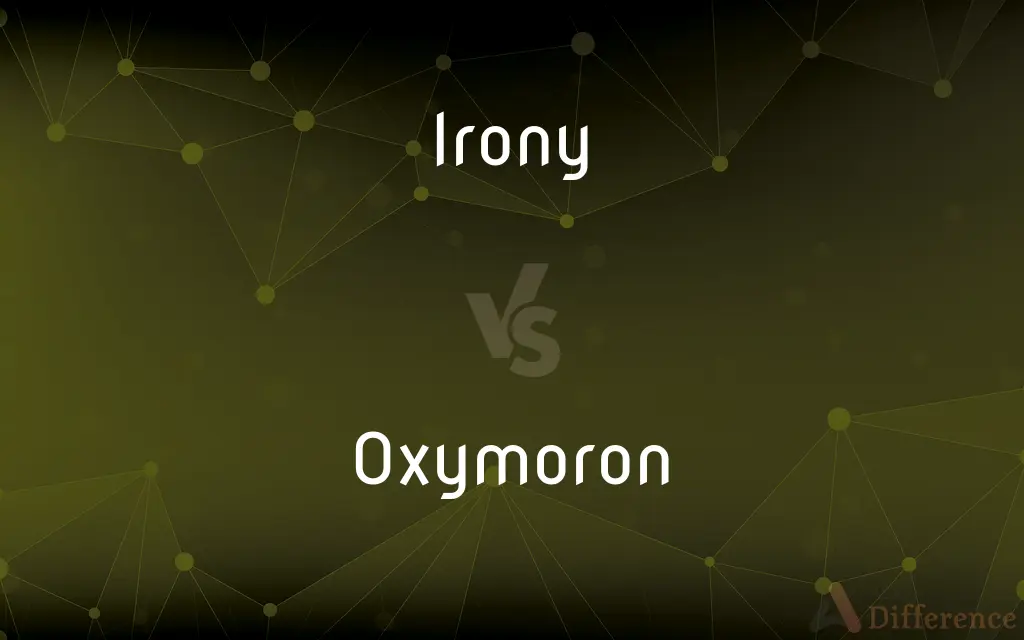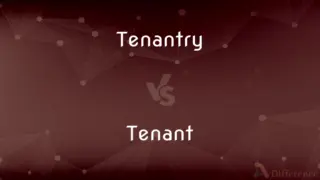Irony vs. Oxymoron — What's the Difference?
By Tayyaba Rehman & Fiza Rafique — Updated on April 15, 2024
Irony involves a contrast between expectations and reality, often used for humorous or emphatic effect, while an oxymoron combines two contradictory terms to create a paradoxical effect.

Difference Between Irony and Oxymoron
Table of Contents
ADVERTISEMENT
Key Differences
Irony is a literary or rhetorical device where the intended meaning of words is different from their literal meaning, often highlighting a contrast between expectations and reality. In contrast, an oxymoron is a figure of speech that combines two seemingly contradictory elements to create a new, often paradoxical meaning.
Irony can be verbal, where someone says the opposite of what they mean for effect; situational, where events turn out contrary to what was expected; or dramatic, where the audience knows more than the characters. On the other hand, an oxymoron directly juxtaposes two opposing terms in a phrase, such as "jumbo shrimp" or "deafening silence," to emphasize a particular attribute or complex reality.
The purpose of irony often includes sarcasm, criticism, or humor, providing depth to text or speech by playing on the dual meanings of words or situations. Conversely, oxymorons are used to create an impactful expression or to convey a deeper level of paradox or complexity in the qualities of an object or situation.
Irony can be found across various forms of communication, from everyday conversations to literature and drama, enriching the content with a layer of meaning that engages the audience's perception and understanding. Oxymorons, while also used in various forms of communication, often appear in poetry and prose to intensify contradictory qualities that can coexist, adding a poetic or dramatic flair.
While irony requires a context to be understood, as the contradiction lies between the surface meaning and the underlying message or situation, oxymorons are self-contained within the phrase and require little external context to appreciate the juxtaposition of opposing terms.
ADVERTISEMENT
Comparison Chart
Definition
A contrast between expectations and reality, often for humorous or critical effect
A combination of contradictory terms for paradoxical effect
Types/Forms
Verbal, situational, dramatic
Usually a two-word phrase
Purpose
Criticism, humor, emphasis
Emphasis, paradox, poetic effect
Usage
Widespread in speech, literature
Common in poetry, prose
Dependency on Context
Requires context for full effect
Self-contained, immediate recognition
Compare with Definitions
Irony
A literary technique used to express something other than and especially the opposite of the literal meaning.
Saying What a pleasant day during a hurricane.
Oxymoron
Often found in literature and poetry to convey deeper levels of meaning and paradox.
Painful pleasure.
Irony
The expression of one's meaning by using language that normally signifies the opposite, typically for humorous or emphatic effect.
A pilot afraid of heights.
Oxymoron
Used to create a dramatic effect or to make a phrase more memorable.
Seriously funny.
Irony
Can be dramatic, where the audience knows more than the characters in the story.
In a thriller, the audience knows the identity of the kidnapper while the characters do not.
Oxymoron
Typically involves just two words that oppose each other.
Deafening silence.
Irony
A situation that is strange or funny because things happen in a way that seems opposite of what was expected.
A fire station burns down.
Oxymoron
A figure of speech in which contradictory terms appear in conjunction.
Open secret.
Irony
Often used to criticize or mock a situation or behavior.
Praising a negligent worker for their outstanding commitment.
Oxymoron
Can sometimes highlight real complexities and contradictions in the world.
Living dead.
Irony
Irony (from Ancient Greek εἰρωνεία eirōneía 'dissimulation, feigned ignorance'), in its broadest sense, is a rhetorical device, literary technique, or event in which what on the surface appears to be the case or to be expected differs radically from what is actually the case. Irony can be categorized into different types, including verbal irony, dramatic irony, and situational irony.
Oxymoron
An oxymoron (usual plural oxymorons, more rarely oxymora) is a figure of speech that juxtaposes concepts with opposing meanings within a word or phrase that creates an ostensible self-contradiction. An oxymoron can be used as a rhetorical device to illustrate a rhetorical point or to reveal a paradox.
Irony
The use of words to express something different from and often opposite to their literal meaning.
Oxymoron
A rhetorical figure in which incongruous or contradictory terms are combined, as in a deafening silence and a mournful optimist.
Irony
An expression or utterance marked by a deliberate contrast between apparent and intended meaning
"the embodiment of the waspish don, from his Oxbridge tweeds to the bone-dry ironies of his speech and prose" (Ron Rosenbaum).
Oxymoron
(rhetoric) A figure of speech in which two words or phrases with opposing meanings are used together intentionally for effect.
Irony
Incongruity between what might be expected and what actually occurs
"Hyde noted the irony of Ireland's copying the nation she most hated" (Richard Kain).
Oxymoron
A contradiction in terms.
Irony
An occurrence, result, or circumstance notable for such incongruity
The ironies of fate. See Usage Note at ironic.
Oxymoron
A figure in which an epithet of a contrary signification is added to a word; e. g., cruel kindness; laborious idleness.
Irony
Dramatic irony.
Oxymoron
Conjoining contradictory terms (as in `deafening silence')
Irony
Socratic irony.
Irony
(rhetoric) The quality of a statement that, when taken in context, may actually mean something different from, or the opposite of, what is written literally; the use of words expressing something other than their literal intention, often in a humorous context.
Irony
(countable) An ironic statement.
Irony
Dramatic irony: a theatrical effect in which the meaning of a situation, or some incongruity in the plot, is understood by the audience, but not by the characters in the play.
Irony
Socratic irony: ignorance feigned for the purpose of confounding or provoking an antagonist.
Irony
(informal){{cite-journal
Irony
Of or pertaining to the metal iron.
The food had an irony taste to it.
Irony
Made or consisting of iron; partaking of iron; iron; as, irony chains; irony particles; - In this sense iron is the more common term.
Irony
Resembling iron in taste, hardness, or other physical property.
Irony
Dissimulation; ignorance feigned for the purpose of confounding or provoking an antagonist.
Irony
A sort of humor, ridicule, or light sarcasm, which adopts a mode of speech the meaning of which is contrary to the literal sense of the words.
Irony
Witty language used to convey insults or scorn;
He used sarcasm to upset his opponent
Irony is wasted on the stupid
Satire is a sort of glass, wherein beholders do generally discover everybody's face but their own
Irony
Incongruity between what might be expected and what actually occurs;
The irony of Ireland's copying the nation she most hated
Irony
A trope that involves incongruity between what is expected and what occurs
Common Curiosities
What is an example of irony in literature?
An example of irony in literature is in Shakespeare’s "Romeo and Juliet" where Romeo thinks Juliet is dead and kills himself, whereas the audience knows she is alive.
What is the difference between irony and sarcasm?
Irony is broader and can be used for humorous or dramatic effect without necessarily intending to mock, while sarcasm specifically involves mocking or scornful language.
Can an oxymoron be more than two words?
Typically, oxymorons are two-word phrases, but they can occasionally extend to longer phrases that embody a paradoxical idea.
Why is irony effective in storytelling?
Irony is effective in storytelling because it engages the audience, making them think critically about the contrast between appearance and reality.
How does situational irony differ from dramatic irony?
Situational irony occurs when the actual outcome of a situation contradicts the expected outcome, while dramatic irony happens when the audience knows more about the events unfolding than the characters.
Can irony be unintentional?
Yes, irony can be unintentional, especially in cases of situational irony where the outcomes are unexpectedly contrary to what was planned.
How does an oxymoron enhance language?
An oxymoron enhances language by combining contradictory terms to highlight a deeper or unexpected truth, adding poetic or dramatic effect.
What makes an oxymoron effective in poetry?
In poetry, oxymorons capture complex emotions and contradictions, enhancing the evocative power of the language.
Is irony always negative?
No, irony is not always negative; it can also be used for humorous effects or to add depth to storytelling without criticism.
What is a common use of irony in everyday speech?
Irony is commonly used in everyday speech to express frustration or to subtly convey displeasure about a situation.
What are the risks of using irony?
Irony risks being misunderstood if the audience does not grasp the intended contrast between the literal and implied meanings.
What is an example of an oxymoron in a sentence?
"The comedian was seriously funny in his latest routine."
How does dramatic irony build suspense?
By letting the audience in on a secret that the characters don’t know, dramatic irony creates tension and anticipation about when the characters will discover the truth.
How can I use an oxymoron to enhance my writing?
Use oxymorons to create striking contrasts and to emphasize the nuanced complexities of your topics or characters.
How can I recognize an oxymoron in text?
Look for phrases that combine words with opposite meanings; these often stand out due to their inherent contradiction.
Share Your Discovery

Previous Comparison
Advise vs. Advisor
Next Comparison
Tenantry vs. TenantAuthor Spotlight
Written by
Tayyaba RehmanTayyaba Rehman is a distinguished writer, currently serving as a primary contributor to askdifference.com. As a researcher in semantics and etymology, Tayyaba's passion for the complexity of languages and their distinctions has found a perfect home on the platform. Tayyaba delves into the intricacies of language, distinguishing between commonly confused words and phrases, thereby providing clarity for readers worldwide.
Co-written by
Fiza RafiqueFiza Rafique is a skilled content writer at AskDifference.com, where she meticulously refines and enhances written pieces. Drawing from her vast editorial expertise, Fiza ensures clarity, accuracy, and precision in every article. Passionate about language, she continually seeks to elevate the quality of content for readers worldwide.















































